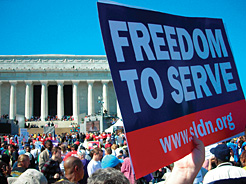At midnight on September 19, the military’s loathsome “Don’t Ask, Don’t Tell” (DADT) policy finally ended on schedule, allowing gay service members to serve openly and proudly.
Advocates who worked to repeal the 1993 rule, which prohibited gay personnel from revealing their sexual orientation and their superiors from asking about it, welcomed the seamless transition towards a more inclusive Armed Forces.
“[DADT repeal represents a] historic milestone along the journey to achieving LGBT equality in America’s military. Thanks to veterans, active duty, leaders, allies and supporters everywhere, this is a monumental day for our service members and our nation,” said Servicemembers Legal Defense Network Executive Director Aubrey Sarvis, an Army veteran. “Our work is far from done, but today we pay tribute to the service and sacrifice of our patriots as we look forward to a new era of military service—one that honors the contributions of all qualified Americans who have served or who wish to serve.”
According to the Williams Institute, an LGBT policy think tank, nearly 80,000 active-duty personnel identify as lesbian, gay or bisexual, and the repeal of DADT is expected to attract 37,000 new service members to the ranks. An estimated 1 million veterans are homosexual.
On December 22, 2010, President Obama signed legislation repealing DADT setting into motion the multi-step process to assure skeptics that the presence of openly gay service members would not damage unit cohesion or morale. For the policy to end, the President, the Chairman of the Joint Chiefs of Staff and the Secretary of Defense were required to certify—after extensive troop training and evaluation—that the repeal regulations were “consistent with the standards of military readiness, military effectiveness, unit cohesion, and recruiting and retention of the Armed Forces.”
Obama, Joint Chiefs Chairman Admiral Mike Mullen, and Secretary of Defense Leon Panetta certified to Congress on July 22 that regulations met requirements and set the date for DADT’s elimination for midnight on September 19.
As the policy expired, previously closeted active service members expressed relief and confidence in their expected acceptance. A survey by OutServe, the association of active-duty LGBT military members, found that 78 percent of more than 500 LGBT respondents were already out to at least some of their unit. Sixty-seven percent believed that their colleagues would treat them “universally” or “generally” without discrimination.
“We are professionals,” said one respondent. “The repeal of DADT allows LGBT troops to do what their straight counterparts already take for granted—to share and talk about life events without fear of repercussion. Shared experience can only lead to a better understanding of who we are as individuals, and contribute to the same mission: protection of those we love and service to our country.”


What Do You Think?